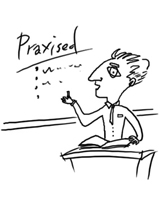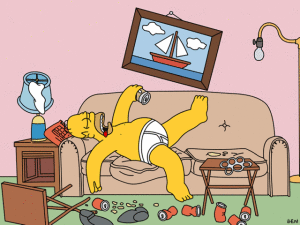Learning a second language as an adult is arguably one of the hardest skills an adult can master. This is especially true for people learning a language far removed from their own, such as a Japanese student learning English or a French student learning Chinese. Data from the Foreign Service Institute suggest that learning a new language can take from 500 to over 2,000 hours before reaching a level of general competency, depending on how related your native language is to the new language you are trying to learn. The hours required to achieve mastery would certainly be much higher.
When you do the math, it quickly becomes apparent that learning a language is going to require hours of daily practice and study over several years, and this means forming some new habits. Unfortunately, forming new habits isn’t something humans are particularly good at. The vast majority of dieters revert to old eating habits¹. The majority of people buying gym memberships never use them.
We’ve all struggled with this, and our students are no exception. Despite the best efforts of teachers to reach all their students, we know that students who enter a class with good study habits are most likely the ones that will succeed. Students with poor study habits, despite their best intentions at the beginning of the semester or school year, typically revert to old study habits (i.e., little to none) within a few weeks of the course. As teachers, we do what we can to make the class active and interesting, and I do believe that a good teacher can get a lot out of students. But even when we do manage to get weaker or less motivated students involved in the class, the time we have with them in the classroom is just a fraction of what they need in the long run. Students need to do more on their own, and short of a teacher visiting every student nightly to make sure they are engaging with the language outside the classroom, it’s difficult to get students to make lasting changes in their study habits.
This shouldn’t be surprising, as most of us are no different. How easy is it for us to eat better, exercise, quit smoking, write that novel we claimed we’d have written by now, and do the hundreds of other things we know we could and should do but simply don’t? I often catch myself (usually in the teacher’s lounge) complaining about students who never do homework while at the same time I’m failing for the 13th time over just as many years to stick to my resolution to lose weight and exercise more.
What I’m trying to say is that just about all of us suck at this.
With Praxis, we find that the majority of the students do exactly the number of sessions required by the teachers, even though the program allows them to do more. In my classes, I make it clear that there are no bonus points for doing additional sessions beyond the target for the class², but I encourage them to study more just for their own benefit. Only about 10% of the students would do this, which is not bad (I can’t think of many other types of homework I’ve given in which students voluntarily did more than what was required without the carrot of bonus points), but I know that in most of my classes a lot more than 10% of the students really do want to learn English. With Praxis, we allow students to study for two months beyond the semester (during the summer or winter breaks). However, our data show that only about 5% of students continue to study on their own. Despite student surveys repeatedly showing that the strong majority of students find the site useful for their learning, once the semester ends they quickly revert back to old habits.
Currently, I’m reading the book Hooked: How to Build Habit-Forming Products by Nir Eyal on my Kindle which discusses this very topic (and has prompted me to write this entry). Speaking of Kindle, I’ve had mine for over 5 months, yet this is the first book I’ve ordered and read on it. Why? Habit. Even though I have long been aware of the benefits of devices like Kindle, my three-decade-plus reading habits have always put me off the change. Will I revert back to paper books after I finish Hooked? At this time that seems unlikely, as it was quite nice to have access to the book literally minutes after a colleague recommended it and I’m enjoying the reading experience, but the very book I’m reading tells me that the odds are against me.
And how about teachers? How many of our teaching practices are rooted more in habit rather than actual best practices? How many good ideas have we seen in presentations or read about in articles, and yet we didn’t even make the first step towards implementing them? How many new practices have we tried for one semester and then soon thereafter reverted back to the old, “tried but not necessarily true” practices we are more comfortable with?
In every school I’ve taught in, I’ve encountered resistance to utilizing technology in the classroom by some teachers. Way back when MOODLE first came out, a few professors in my university introduced it to the rest of the faculty and went so far as to set up accounts for all the teachers. The presentation seemed well received, yet only about half actually followed through that semester, and even fewer were still using it a year later. A number of other innovative technologies met the same fate. I was frustrated with the faculty at the time, but now I realize this had more to do with the difficulty of breaking habits than anything else.
Marketing professor John Gourville at Harvard Business School says that a new product just can’t be better than what currently exists, but it needs to be 9 times better in order to get people to break their habits. It takes something dramatic to get us out of our cognitive ruts. Naturally, this is of particular interest to people like us at Praxis and the developers of other online vocabulary sites. We all know that students need a lot more vocabulary than can be provided in the traditional classroom, and these sites have a proven record of doubling if not tripling the amount of vocabulary learned over a semester. Nonetheless, this is not enough to move the majority of educators.
Octuple the benefits or GTFO
Hooked author Nir Eyal has a number of things to say on the topic (which is a good thing, or his book would be about as long as this blog entry). The focus of the book is on developing products that will attract customers, but this information is clearly useful to anyone who is looking to form better habits that can last longer than two weeks. I’ll have a few more blog entries on the book in the near future.
1) Kassirer J, Angell M. Losing weight—an ill-fated New Year’s resolution. N Engl J Med 1998;338:52–4.
2) When I’ve taught classes on a curve, I worried that allowing bonus points for homework would lead to too much competition and stress among students who were struggling to get the few available A grades. Also, some students prefer to do vocabulary for points rather than other more communicative activities, and I’d prefer that they maintain a balance of individual study and communicative practice.


